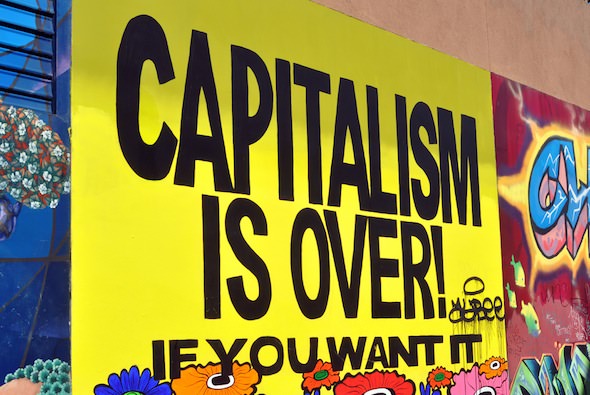Lewis Lapham and Thomas Frank Forecast the Next American Revolution
The Harper's Magazine associates have had their eyes on America and its moneyed rulers for a combined nine decades. In a bookstore conversation about the latest issue of Lapham's Quarterly, they name the forces conspiring to drive the nation into another age of upheaval.
Harper’s Magazine associates Lewis Lapham and Thomas Frank have had their eyes on America and its moneyed rulers for a combined nine decades. In a conversation in late March at the Brooklyn bookstore BookCourt, the two talked about the current “Revolution” issue of Lapham’s Quarterly and named the forces conspiring to drive the nation into another age of upheaval. The discussion was featured in Frank’s column on Salon on Sunday under the title “Our Sad ‘Mad Men’ Revolution: How Consumerism Co-Opted Rebellion.”
To begin, Lapham, who says that as a journalist he has never been concerned with stoking revolution, describes the current issue of his Quarterly as taking on revolutions of various kinds — “political, scientific, technological.” To his mind, he says, those of us alive today are always in the midst of the revolution announced by Karl Marx in 1848, which is “the constant change in the means of production and the reducing of all human meaning and endeavor to a money transaction.”
Americans on both the right and left are anxious for drastic social change. Many are seeking to make it happen themselves. Lapham understands the evolution of civilizations, of which revolution is a part, to occur along lines determined by ongoing historical trends, including the breakdown of a society’s overextended parts in the manner that growing bubbles inevitably pop. “I suspect that if any genuinely revolutionary change takes place it will be forced upon us by a collapse of some kind in the system,” he told the bookstore audience. “That’s another form of revolution that you find across time where the civilization or the ancien regime falls apart of its own dead weight. And in the ruins, the phoenix of a new idea or a new thought or a new system of value takes its place. But that’s not something that can be organized by a committee or preached from a column in the New York Times, or even by a four-day conference about American values sponsored by the Rockefeller Foundation.”
“I don’t think we have to be concerned that we’re not parading around in the streets,” he added. “It will come of its own accord sooner rather than later.”
Frank added that he doesn’t “think Lewis is saying that [social order] will collapse on its own accord. Just that it will become corrupt… Everything else is up to us. To count on the dialectic to change anything or to rescue us is an absurdity. I think it’s a terrible mistake.”
In a chilling story about the limited vitality available to the American counterculture, Lapham described “the death of the Beat Generation in San Francisco in 1959,” which he said he witnessed. He was at the scene’s “last holdout” bar on a Tuesday afternoon. Beat figures John Kerouac, Ken Kesey and Allen Ginsberg were long gone. Out of nowhere a Hollywood producer, “dreadful looking … gold chain, white shirt, paunch, slicked back hair,” walks in and tells all the young, somnolent patrons he wants to cast them as extras in a movie. The pay was $50 a day each, but the boys had to shave their faces and put on khaki pants and blue button-down shirts, and the girls, tweed skirts. “One of you can still look dark and sullen,” the guy said. “This is a movie for Americans.” Everyone ignored him. Then he finally stopped talking.
“There’s a terrible, terrible silence,” Lapham recalled. “And then comes the even more terrible sound of a scraping of chairs. And the entire place emptied out and they were back in an hour, clean-shaven, white blouse, bobby socks. And that was the end of the Beat Generation.”
Frank, the author of “The Conquest of Cool,” a 1998 book about how capitalists subverted the mid-to-late 20th-century critique that it generates conformity by co-opting and commodifying the culture of rebellion, confirmed the meaning of Lapham’s story. “Individual economic leaders can be very stupid people. … But the system itself has a kind of genius. And what the system did back in the Sixties is it took the symbols of the counterculture and used them to reinvent itself. … By the end of the 1960s capitalism is this wonderful, sensitive, fantastic thing,” Frank said.
The conversation moved on to a recognition of the finance sector as a parasite “eating the brains out of the host” of the real American economy, “much of which has been outsourced in one way or another, or entrusted to machines.” Each time the economy collapses, Lapham explained, the foundation upon which it rests “gets thinner” as “the debt gets higher.” Frank recognized that the opposition located in today’s American left consists mainly of “journalists and bloggers,” lacking almost entirely the organized labor that “actually used to get things done.” Their enemy is not an idea known as capitalism, but simply an economic “mechanism” that goes by the name, which is captained and exploited by the leaders of “heavily entrenched interests.”
“The only idea that I can ever see in the minds of the moneyed interests is that money is good for rich people and bad for poor people,” Lapham said. “That’s about the beginning and end of their idea, I think.”
But what about opposition to economic selfishness masquerading as an idea? Where is the will to set things right? Lapham addressed himself to the genuine ideas that informed the values stated in the U.S. Constitution and their ability to survive in the atmosphere of moral and creative deprivation that enshrouds the country today.
“Civilizations, empires only last as long as there is a morale and an idealism and an energy sustaining it. To me, that seems to be exhausted,” he said. “There’s a good deal of cynicism. We don’t have enough people in this society who believe in democracy. That goes to your point about they’re there for the speech and then they leave for the rest of it. [Ralph] Nader has written wonderful books about this. He said, If a million people in the United States would give $100 and 100 hours of their time we could make truly significant change. But if you don’t have people who believe in it passionately it loses its energy. It dies according to the second law of thermodynamics. It’s a form of moral entropy.” Hence our present kind of civilization, “based on the global capitalist system of money,” faces virtually no external threat.
Among the conversation’s themes is the idea that capitalism threatens itself. One of the ways it does so is by continually abusing the population, of which many members are nonessential to its operation. Frank said that many of his young friends “supposed to be going out and starting life” carry over $100,000 in student debts. Lapham referred to the efforts of economist Michael Hudson, whose scholarly and popular work is concerned with the conversion of American citizens into debt slaves, as if democracy never existed.
“That is how we will enslave the American people,” Lapham said. “I mean, the great source of capital, of course, is milking the American public on their debt. That’s how the credit card companies operate. You think of cattle in pens in California, the way they grow beef. You might as well think of the American population as giving off interest, stuffed with junk commodities and then paying forever with … just standing still.”
— Posted by Alexander Reed Kelly.
Your support matters…Independent journalism is under threat and overshadowed by heavily funded mainstream media.
You can help level the playing field. Become a member.
Your tax-deductible contribution keeps us digging beneath the headlines to give you thought-provoking, investigative reporting and analysis that unearths what's really happening- without compromise.
Give today to support our courageous, independent journalists.




You need to be a supporter to comment.
There are currently no responses to this article.
Be the first to respond.